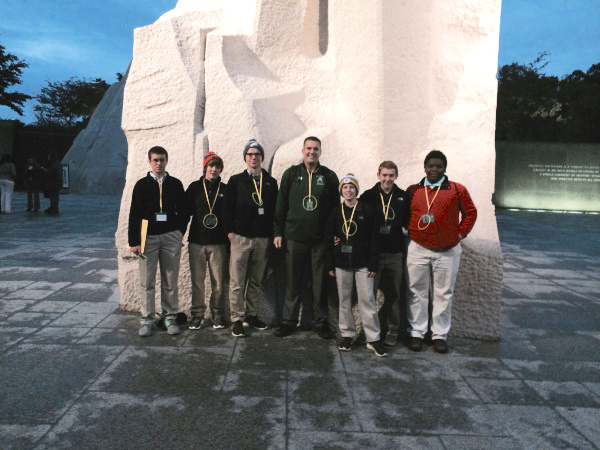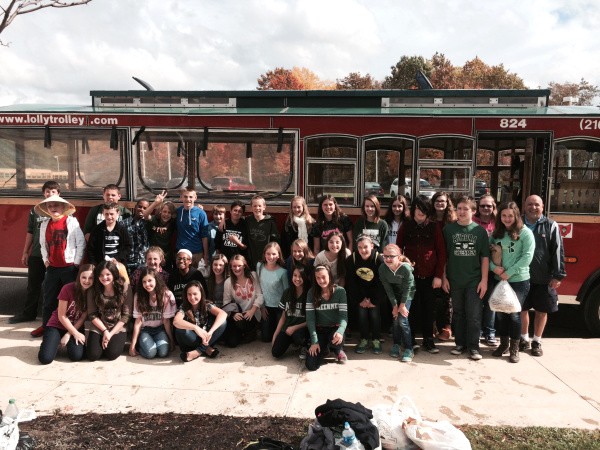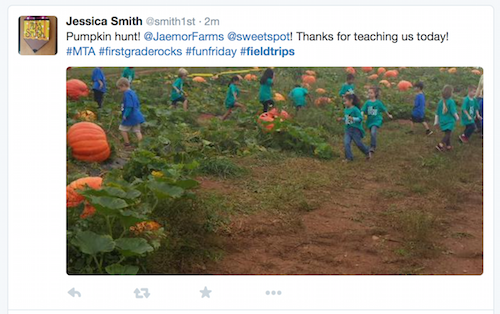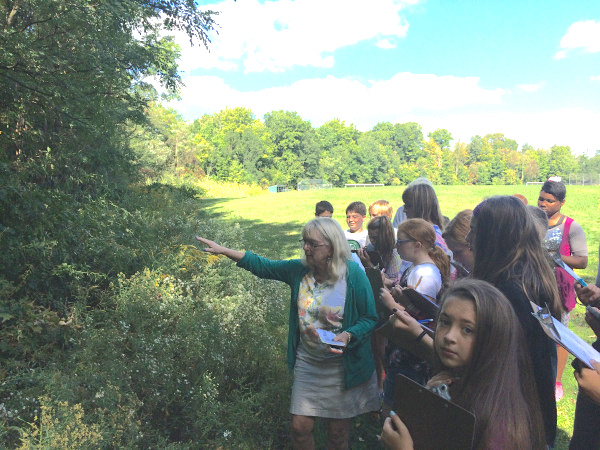Middle Grades Kids Need Field Trips

Autumn has quickly become one of my favorite times of the year. Yes, football is in full swing, but more importantly, fall is when we take our 220+ 8th grade students to Washington, D.C.
As a former science and history teacher, I get excited when I have the opportunity to chaperone this trip. Here in Ohio, our trip is correlated perfectly with our content standards, so our entire expedition becomes the ultimate learning experience.
The social studies teacher in me loves being able to be a part of the student’s experience as they explore American History first hand. The science teacher in me loves pointing out the landforms, waterways, museums, and various science awesomeness that you will find on our way to and in D.C. And the middle level advocate in me loves the opportunity to build connections with kids and experience learning together.
As I listened to our fantastic teachers plan and coordinate this trip, all I could think about was how great of an opportunity for learning students have. Mr. Frankmann, who is our social studies guru and trip coordinator, talks passionately with parents about how he will reference and revisit aspects of the DC trip throughout the entire year. Is there a better way to learn than experiencing it first hand? Personally I don’t think so. This experience will not only enhance their entire 8th grade year, it will enrich their lives.
Why field trips are important
Middle school is an opportunity for exploration and exposure. Students are changing, learning, and growing at an exponential rate. We need to provide our students with authentic experiences that allow them to explore the world around them “face to face.”
Well-planned field trips will allow kids to see how the content they are learning in school can be applied to the real world. Long after they return, what they saw and did will enliven their classroom discussions and deepen their understanding of academic material.
Do all field trips need to be extravagant? No, they don’t. They just need to be an opportunity for authentic learning. We also take our 7th grade kids on a culture field trip around Cleveland, Ohio.
This trolley tour allows students to see and learn more about all of the cultures that make up our larger community – the same cultures that they are studying in 7th grade social studies. Again, we are creating teaching “hooks” that will prompt discussions and new opportunities to make learning connections. And we’re having a lot of fun!

This is something that I think we as educators need to do more of. We need to use the resources around us so kids can experience learning. We need to seek out and provide these opportunities.
I’m sure the teacher in all of us has been somewhere and said, “It would be awesome to bring my class here.” So why not take them there? I know we live in a world with budget cuts and no-field-trip policies, but if you have the ability to go, take students and explore, learn, experience, and grow.
4 steps to a successful field trip any time of year
A good field trip does not need to be elaborate, just well thought out.
Step 1: Come up with an idea
Inspiration for a field trip can come from anywhere. It might be somewhere local where students can walk or as far as across the sea. A local newspaper, a google search, or asking for suggestions on Twitter (try #fieldtrips) can provide teachers with the inspiration that they need to create an opportunity for kids.
Wherever and whatever you choose, make sure it will be a memorable experience – something that will prompt them to one day say, “Remember when we went to ____________?” I am positive that if you ask a kid a question about a good field trip 5 years later, they will be able to answer it. Can we say that about the Chapter 2 assessment?
Step 2: Tie it to student learning
If you are planning on taking a field trip, you are going to need approval from school leaders. In order to get approval, your field trip must be tied to student learning.
I recommend looking for big-picture ideas that are cross-curricular. As middle level educators, we need these interdisciplinary connections to cement student learning. When you go to seek approval, if you can show that this experience will impact student learning across multiple subjects, your chances for approval can increase.
And if you are not sure how it will fit with other subjects, collaborate with your peers. Get their ideas and input. Allow their enthusiasm to build the support for the trip. If an enthusiastic interdisciplinary team seeks approval for a learning experience that benefits all learners, it will be difficult for leadership to turn them down.
Step 3: Plan, plan, and plan
You have an idea that will be an great student learning experience. It’s supported by your administrator and your teaching colleagues. You’ve briefed parents and families, and they’re on board. So you must be golden, right?
Not so fast. What is usually not mentioned when talking about student field trips is the planning that must take place. Think about it. You are taking kids (from dozens to hundreds) out of their daily routine to do something that they have probably never done before. Chances are you’ll be visiting in an area that they have never been before. Oh yeah, let me add: They are middle school kids.
So develop a plan and share with others for feedback. If you’re not sure about everything to include, see Step 4.
Step 4: Review this checklist
Here are some important things that must be accounted for when planning and implementing a field trip:
- Medication – You must connect with the school nurse and/or parents to make sure all students’ medical needs are met.
- Chaperones – You must make sure that there are manageable groups for the trip. If you are going someplace, ask beforehand what their student-to-chaperone ratio is. Also, make sure that all students with special needs receive the accommodations for them to best experience the field trip as well.
- Emergency medical contacts – You need to make sure these are updated and with you at all times. All chaperones need to carry a cell phone in the event of an emergency.
- Confirmation – Always confirm everything, twice. The extra five minutes is well worth the headaches and explaining that you will have to do if the transportation does not show up, or you did not purchase the tickets. Confirmation is also a courtesy to wherever you are going. They like to be reminded, because they are planning to welcome your middle school students.
- Contingency plan – Things are going to go wrong. Don’t sweat the small stuff, but be prepared for the big stuff. Know how to split the groups if something happens to a chaperone. Know the contact numbers of school in case the bus were to break down. As a middle school team, talk about everything that could go wrong, and have discussions on what your plan of action will be in the event that it does. You can’t overplan here. These are your kids, you are responsible for them, and their safety is number one. Do not let something go to chance.
- Stay behinds – It saddens me, but there are always students that do not go on the field trip. You must have a relevant learning experience for them too. DO NOT just have them sit in a room as a study hall if they cannot participate. Most kids cannot attend for reasons beyond their control. Please do not punish them for not going. Come up with some fun for them too.
- Don’t let cost be a barrier – It is critical that you make sure financial reasons do not stop a kid from participating in a field trip. Do whatever you can to support that student in going. Each district is different, but every effort MUST be made to ensure finances do not affect participation.)
Pulling it all together

Go out and find great field trips for your kids. Let them see the world as their classroom. This is the single best thing you can do for them. Once students see the world as a vast learning laboratory, they will understand that learning is constant and limitless. If we can get students to realize and practice this, we will have achieved the greatest success educators can hope for – the creation of “lifelong learners.”
►For more ideas about field trips, see Amanda Wall’s “6 Tips to Boost Learning on Class Field Trips” here at MiddleWeb.
Mike Janatovich (@mjanatovich) is Principal at Cuyahoga Heights Middle and High Schools in Ohio. Before taking his current job this school year, he spent several years as an elementary principal and as a middle school assistant principal after ten years as a 7th and 8th grade science and social studies teacher. As a middle level advocate, Janatovich believes that educating the whole child is critical in ensuring academic success. He was a member of the ASCD 2015 Class of Emerging Leaders. Click here to read more of his writing for MiddleWeb.







































Best article I’ve read on field trips and preparing for them so they will be quality trips that will be remembered. Thank you!